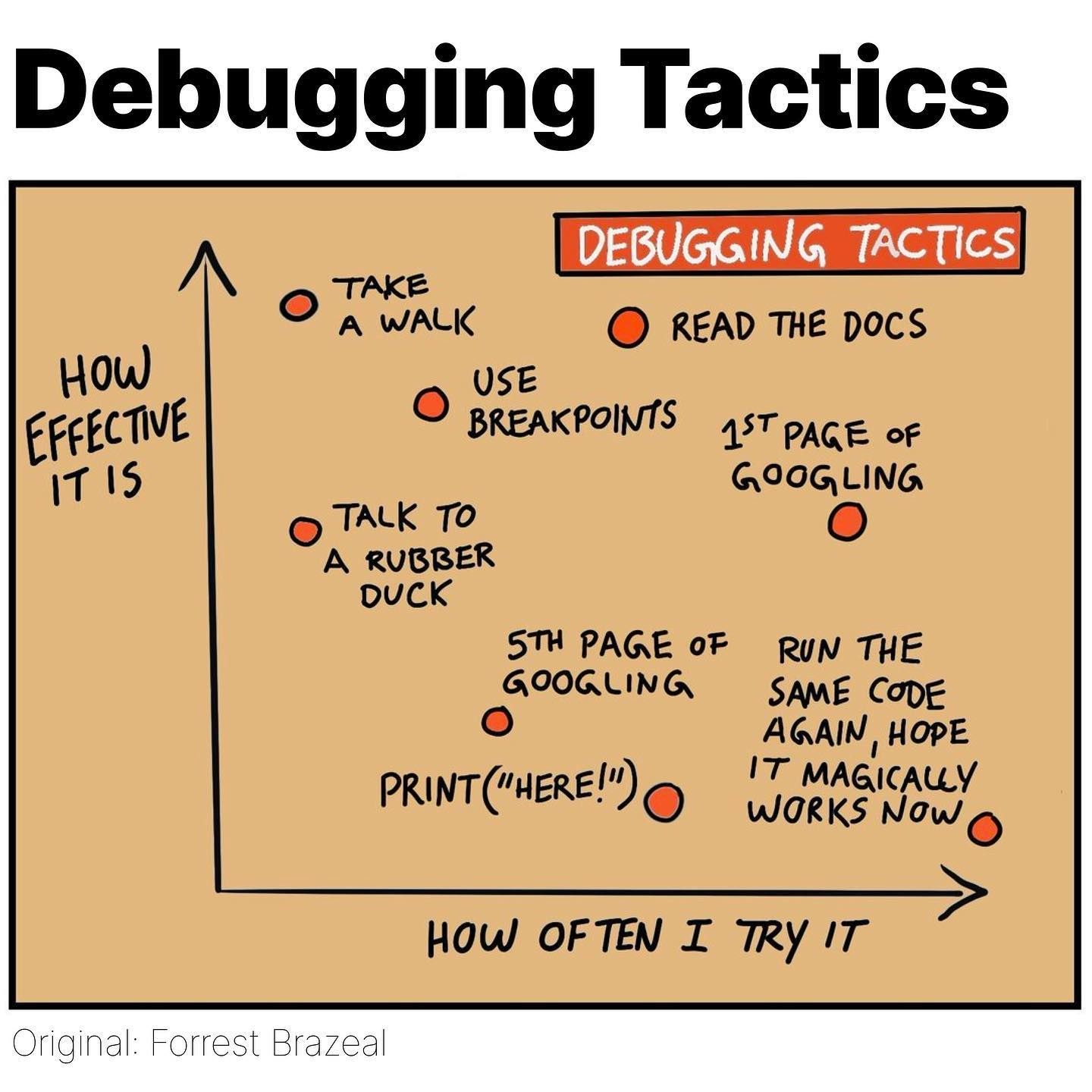Lessons Learned from The Pragmatic Programmer Book
 Mustafa Büyüksoy
Mustafa Büyüksoy
⌘ Key Takeaways
Invest regularly:
Learn at least one new language every year
Read a technical book each month
Read nontechnical books, too
Take classes
Participate in local user groups and meetups
Experiment with different environments (Linux etc.)
Stay current
Diversify: Increase your knowledge base and familiarize yourself with new technologies.
Manage Risks: If you just learn one technology and its use begins to decline, so does your level of knowledge. For this reason, do not bind all your knowledge to one basket.
Buy low, sell high: If you learn a new technology that no one has heard of, you will be able to open many business doors when it becomes popular.
Review and rebalance: Periodically review your knowledge portfolio, discard outdated technology that is no longer necessary, and pick up new skills.
Try not to be perfect, just always do good.
Tracer Bullets: Development to visually illustrate the need for immediate feedback under actual conditions with a moving goal. Prototyping generates disposable code. Tracer code is lean but complete and forms part of the skeleton of the final system.Estimating: Doubling the effort on the model may give you only a slight increase in accuracy. Your experience will tell you when to stop refining.
Always take small steps, checking for feedback and adjusting before proceeding. Making code replaceable will also help with cohesion, coupling, decoupling, and DRY, leading to a better design overall.
Write code that bends and doesn't break:
Reactive or PubSub patternswork well with your software.Concurrency is when the execution of two or more pieces of code act as if they run at the same time. Parallelism is when they do run at the same time.
If you're not sure why it works, you won't know why it fails. Document your assumptions. Don't just test your code, but test your assumptions as well. Prioritize your effort. Spend time on the important aspects; more than likely, these are the hard parts.
Introduction
"The Pragmatic Programmer" is a classic book that has helped numerous developers improve their skills and develop a pragmatic approach to software development. It is a must-read for all aspiring and experienced programmers who want to become better at their craft. In this blog post, we will discuss some of the key lessons learned from this book.
Being a Pragmatic Programmer
One of the core principles of "The Pragmatic Programmer" is to be a pragmatic programmer. This means that you should always focus on practical solutions that work in the real world. As a programmer, you should always strive to create simple, elegant, and maintainable code that solves the problem at hand. You should avoid over-engineering your solutions, as this can lead to unnecessary complexity and maintenance issues down the line. In addition, being a pragmatic programmer also means that you should continuously learn and improve your skills. This includes learning new programming languages, tools, and techniques that can help you become a better programmer.
The Importance of Testing and Debugging

Another key lesson from "The Pragmatic Programmer" is the importance of testing and debugging. Testing is an essential part of software development that ensures that your code works as expected. It includes unit testing, integration testing, and acceptance testing. Debugging, on the other hand, is the process of finding and fixing errors in your code. It involves using tools and techniques to identify the root cause of the problem and fix it. By writing tests and debugging your code, you can ensure that your software is of high quality and performs as expected.
Using Agile Methodologies
"The Pragmatic Programmer" emphasizes the importance of using agile methodologies in software development. Agile methodologies are a set of values and principles that prioritize collaboration, communication, and flexibility. They include practices such as Scrum, Kanban, and Extreme Programming (XP). By using agile methodologies, you can ensure that your team is working efficiently, delivering value to customers, and continuously improving their processes. I believe, and this is just my opinion, that you might not always use agile methodology on every project; instead, you might use the cycle technique. For more information, visit Shape-Up.
The Importance of Code Reviews
The value of code reviews is a crucial lesson that "The Pragmatic Programmer" imparts to us. A strong tool for finding bugs, enhancing the quality of the code, and promoting teamwork is code reviews. You can get feedback on your design decisions, find mistakes before they are used in production, and learn from your peers by asking other developers to review your code. Code reviews also assist in ensuring that your code is scalable, maintainable, and simple to comprehend.
Using Design Patterns
Design patterns are another topic that "The Pragmatic Programmer" covers extensively. Design patterns are reusable solutions to common software design problems. They provide a way to standardize your code and make it more maintainable and scalable. By using design patterns, you can avoid reinventing the wheel and leverage proven solutions to common problems. Some of the most popular design patterns include the Singleton pattern, Factory pattern, and Observer pattern.
The Importance of Documentation
Software development is not complete without documentation, which makes it easier to understand and maintain your code. It contains everything, from user guides and technical specifications to code comments and README files. You can make your software easier to maintain, help other developers understand your code, and onboard new team members more quickly by documenting your processes and code.
The Importance of Continuous Integration and Delivery
Continuous Integration (CI) and Continuous Delivery (CD) are two practices that "The Pragmatic Programmer" advocates for. CI is the practice of integrating code changes into a shared repository frequently, and automatically building and testing the changes. CD, on the other hand, is the process of automatically deploying code changes to production after passing all tests. By using CI/CD, you can ensure that your code is always in a releasable state, catch errors early, and reduce the risk of breaking changes in production.
Using Version Control
The practice of tracking and managing changes to your code over time is known as version control. It enables you to collaborate with other developers, track changes, and revert to previous versions as needed. Git, Mercurial, and SVN are the most popular version control systems. You can ensure that your code is well-managed and that changes are tracked and documented by using version control.
Automating Your Workflows
In "The Pragmatic Programmer," automation is yet another prominent issue. It is the act of automating repetitive tasks like writing and testing code, launching applications, and maintaining infrastructure. You can save time, minimize errors, and guarantee team-wide consistency by automating your workflows. Jenkins, Ansible, and Terraform are a few well-liked automation tools.
Writing Clean Code
Clean code is code that is easy to read, understand, and maintain. It follows best practices, such as using descriptive names, writing small functions, and avoiding code duplication. By writing clean code, you can make it easier for other developers to understand and modify your code, reducing the risk of introducing errors.
The Importance of Soft Skills
The importance of soft skills is highlighted in "The Pragmatic Programmer," to finish. Soft skills are non-technical abilities like problem-solving, teamwork, and communication. They are necessary for productive teamwork, collaborating with other developers, and providing customers with value. You can improve as a developer, forge closer bonds with your coworkers, and advance your career by honing your soft skills.
Last Words
To sum up, "The Pragmatic Programmer" is a book that every software developer should read. You can become a better programmer, increase the quality of your code, and collaborate with others more successfully by following its principles and practices. You can advance your programming abilities by being a pragmatic programmer, emphasizing testing and debugging, utilizing agile methodologies, conducting code reviews, utilizing design patterns, documenting your code, automating your workflows, writing clean code, and improving your soft skills. I hope that this blog post has given you insightful information about this book and its lessons.
Subscribe to my newsletter
Read articles from Mustafa Büyüksoy directly inside your inbox. Subscribe to the newsletter, and don't miss out.
Written by
